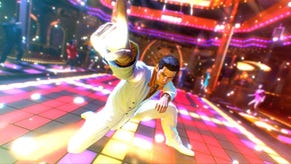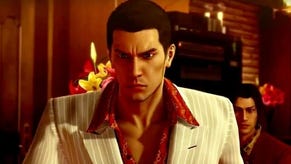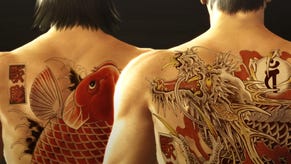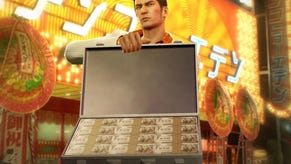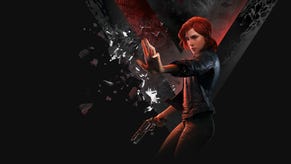Yakuza 0 review
Dragon age: origins.
Yakuza and the 1980s: it always looked an ideal fit, and so it proves. The series that never does anything by halves enters the decade of excess in a pulverising bombardment of bone-shuddering violence, overwrought melodrama, sentimentality and silliness, where just about everything is dialled up to 11. The bonkers and frequently brilliant result is the best Yakuza to date and one of the finest Sega games in years.
It might take a step back in time, but Yakuza 0 is a stride forward in every other sense. Take the storytelling, for starters. For all its ambition and variety, Yakuza 5's multi-stranded plot sagged in places and felt rushed in others. Zero, unburdened by the need to accommodate the expanded cast of more recent entries, focuses on just two playable characters - stoic series regular Kazuma Kiryu and loose cannon Goro Majima - and two narrative threads, which begin some distance apart before inexorably drawing together and eventually becoming intertwined. This affords the individual strands room to breathe, leaving space for character development without slackening the pace.
Kiryu's tale - set, as ever, in the pleasure district of Kamurocho, rendered here in rich, bustling detail - centres on a tiny plot of land known simply as the Empty Lot, the ownership of which is set to prove crucial to a forthcoming regeneration project. Factions within the ruling Tojo clan find themselves competing against a new player, Tachibana Real Estate, headed up by a mysterious outsider with good reasons for laying claim to the land. Kiryu finds himself dragged into the mess when a debt collecting gig goes bad and he's framed for murder on the same patch, forcing him to operate outside the clan's jurisdiction as he investigates who wants him out of the picture. Majima, meanwhile, is in Sotenbori, Osaka - and in hock to the unbearably smug Omi Alliance chairman Sagawa, whose comeuppance you'll be anticipating from his very first scene. Having been excommunicated from the yakuza, he's trying to work his way back into favour as manager of a cabaret club, until he reluctantly agrees to pull off a hit, the fallout from which sets him on a collision course with some very dangerous people.
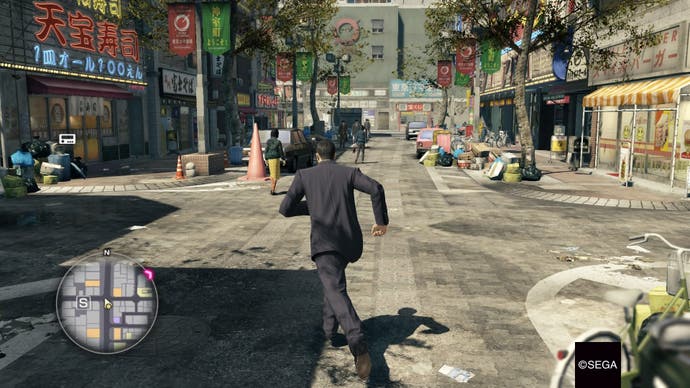
The narrative is entirely self-contained, but it's likely to mean more to anyone who played the original Yakuza because the two threads essentially double as origin stories. As the de facto lead, Kiryu's journey to becoming the dragon of Dojima initially seems like the biggest draw. Yet it's Majima who steals the show, this charismatic wildcard demonstrating heretofore unexplored depths. His introduction is a classic: an extended cutscene-cum-tutorial that distils the essence of Yakuza into a single, glorious set-piece, as it patiently builds to a masterful reveal and a piece of showmanship (involving the humiliation of a lecherous punter) that will make you want to applaud. Later, he silently conveys the frustration of a man forced to keep a lid on his simmering rage and acquiesce to the mob bosses who left him with one eye, and we also get to see a much softer side to him, culminating in a moment of heart-rending selflessness. It recontextualises everything we thought we knew about the self-styled 'mad dog of Shimano' to the point where you might even experience a mild twinge of disappointment whenever the story swings back toward Kiryu.
It's brought to life by the series' finest localisation effort so far, a reminder of the value of its publisher's investment in Atlus. One or two of the more colourful colloquialisms feel a little anachronistic, but otherwise it's incisive and witty, with some wonderfully creative profanity. The script is aided by excellent voice acting and performance capture: Naughty Dog might have the edge in verisimilitude but in the unnervingly pore-perfect detail of the faces and the expressiveness of the animations - some remarkably subtle, some purposefully exaggerated - this is best-in-class stuff.
The rhythms of the game are broadly the same as before. You're mostly free to explore Kamurocho and Sotenbori at your own pace, outside a few occasions where the narrative dictates you stick to a linear path. As you wander, you'll sometimes be approached by a variety of street thugs and gangsters, who'll pick a fight for some imagined slight. After you beat them, you'll head to your destination where a lengthy conversation or confrontation - or both - awaits. Or you can tackle one of an even broader range of side activities, including slot car racing and a quite fabulous rhythm-action disco dancing minigame.
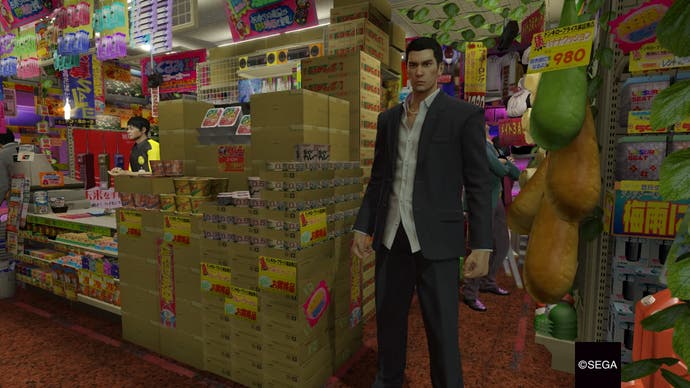
Combat, too, benefits from some thoughtful refinements. Both fighters can switch between three different fighting styles on the fly: one's a fairly standard brawler, another lets you launch flurries of quick attacks while a third sacrifices pace for power. In keeping with the 'greed is good' mantra of the time, you'll accrue money instead of experience from every street fight, which you'll invest - along with the cash you've gained from side activities - in extra moves, extensions to combo strings and boosts to your health and Heat gauges. The latter, if you're new to the series, builds when you land successive attacks, letting you pull off an array of spectacularly vicious finishers. Though Kiryu's Beast style is fun, as he hunches his shoulders and curls his arms like an angry gorilla protecting its territory, two of Majima's options are even better: Slugger sees him wielding a baseball bat like nunchaku, while Breaker lets you chain a series of violent street dance moves from windmills to backspins, as you send groups of goons sprawling in a blur of kicks before grabbing some extra Heat with a stylish freeze pose. There's a lingering stiffness at times - which the forthcoming Yakuza 6 looks to have resolved - but this is the most satisfying Yakuza's combat has ever been.
Fighting is a defining characteristic of the Yakuza experience, yet Zero is anything but an empty-headed brawler. Violence here is about so much more than just shallow empowerment. Even as it celebrates the primal appeal of confronting abusive goons and smashing their faces in, it doesn't shy away from examining the consequences - sometimes to shattering effect. It acknowledges that violence almost always begets more violence, and that the yakuza life often involves personal sacrifice. Is there not, it suggests, a certain nobility in allowing oneself to becoming a monster to prevent others from succumbing to darkness? Sure, you could reasonably argue that it glamorises brutality by the way it indulges in the act - particularly in its more elaborate, showy Heat moves. But there's always a justification, a purpose; something or someone to fight for. Crucially, you never start a fight - though you'll usually finish it.
Sega's clearly aware that you will, on occasion, need a break from all the back-breaking and bloodletting. As such, several recreational activities have been folded into story missions, from karaoke competitions to dance-offs and impromptu visits to takoyaki stands. More side quests are set along the critical path, increasing the likelihood of getting distracted from the story - though it's hard to refuse either way when you're greeted by someone needing urgent help. Where the main plot plays things with a pretty straight bat, it's here that Yakuza explores its sillier side: in one case a shy dominatrix asks you for lessons in assertiveness; in another, you'll coach a boy band on how to appeal to a more mature audience. And in one preposterous set-piece, you'll protect Michael Jackson - sorry, Miracle Johnson - from actors dressed as zombies as he moonwalks from one end of Tenkaichi Street to the other. Later, after winning his friendship, you can recruit him as an adviser to Kiryu's burgeoning real estate empire (see sidebar), albeit for an eye-watering fee. If all this sounds a little puerile - an entirely reasonable observation - then most of it can be happily ignored.
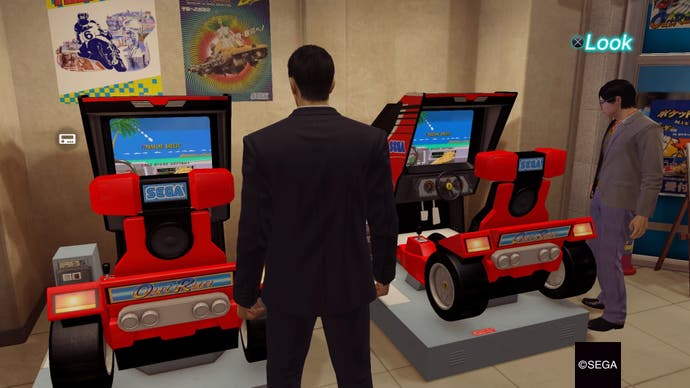
The same can't always be said of the game's treatment of its female cast, most of whom fall into one of two categories: eye candy or victim. Though Kiryu and Majima make a point of encouraging others to respect women, it can seem hypocritical in a game which invites you to watch softcore videos while relaxing in the gentleman's way (though it's relatively tame in what's shown: the video, ahem, climaxes with a close-up of a box of tissues, as Kiryu lets out a satisfied sigh). Elsewhere, you can attend catfights where two barely-clad wrestlers with ludicrous, pendulous breasts grapple one another as you play rock-paper-scissors to influence their next move. True, Yakuza has explored the seedier side of its pleasure districts before, and Zero makes efforts to introduce stronger female characters: one, central to the plot, displays remarkable fortitude, while an ass-kicking debt collector teaches Kiryu how to better unleash his inner beast. But if the case for the defence is that it's a representation of a particular culture at a particular time - one notably unafraid to paint men as drooling perverts - there's an easy counter to arguments about authenticity: Michael Jackson, real estate mogul.
Yakuza's greatest asset is its heart. Its tough side is counterbalanced by a disarming tenderness: its side quests are almost exclusively about helping others in need, and its narrative focuses on the honour of fighting for the people you love and the causes you believe in. And when action rather than compassion is required, it provides the context to let you break faces without feeling too guilty about it - pitting you against a bunch of hateful bastards, piling on even more reasons to hate them, and then letting you enjoy delivering justice in cathartically brutal fashion.
By the note-perfect ending, which brings one chapter to a close as another begins, the old guard has made way for the new. Setting aside the upcoming Yakuza Kiwami (a ground-up remake of the original, with Majima's role wisely expanded), that's true of the series, too, with Yakuza 6 promising an improved game engine, smoother combat and a more seamless open world. Though a return to Kamurocho isn't far away, Yakuza 0 is, in many respects, the end of an era - and a heck of a finish it is, too.
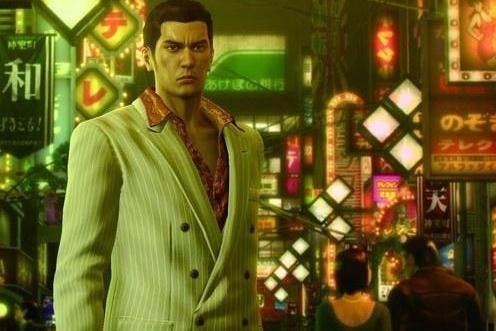


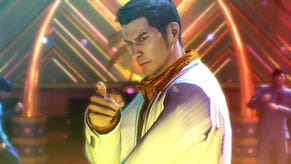
.jpg?width=291&height=164&fit=crop&quality=80&format=jpg&auto=webp)

